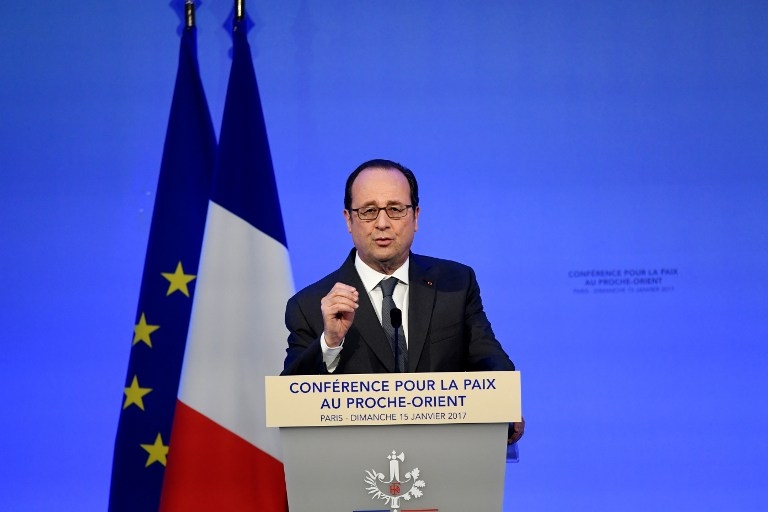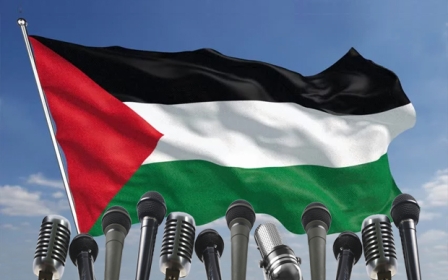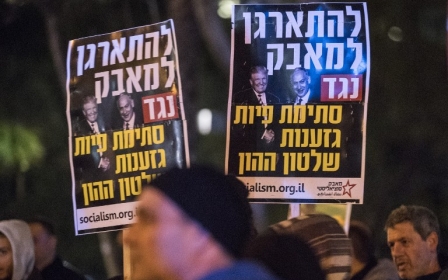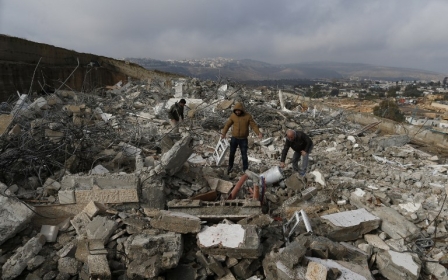The Paris peace conference without the peace

The celebratory speeches of the Paris Conference, in anticipation of positive change, were a total mockery of justice.
Weariness about these conferences continues as they replay the efforts of the 2000 Clinton Parameters and the 2003 Roadmap for Peace document - except in a contorted and retrogressive manner, especially in the case of refugees, Jerusalem and borders.
It merely conspires to further strip agency from the Palestinian public in a push for a virtually dead two-state solution
The impetus for the conference in Paris, like similar international efforts before it, was not to address the Palestinian reality and the roots of the issue, but rather to contain yet another Middle Eastern nuisance.
It's the approach of an international community dealing with an inconvenience, rather than an endeavour to undo the injustice enacted on Palestinians as an indigenous population.
The fact that the Paris conference willfully chose to disregard the actual voices of those dealing with the consequences of the oppression, is a testament to the continued refusal of the international community to be in touch with the reality on the ground.
It is a patronising attitude that Palestinian officials see as a step forward, when it merely conspires to further strip agency from the Palestinian public in a push for a virtually dead two-state solution.
The Palestinian struggle is thus reduced to a vision set by powers, which believe that they are more fit to decide our fate than we are.
Perpetual state of symbolism
Like some sort of extended metaphor in a tragic novel, Palestine has been in an unabated stalemate.
The grave of Yasser Arafat, with a light pointing in the direction of Jerusalem in the evening, is the emblem of our unrelenting wishful thinking, without working towards achieving our aspirations.
The only real concomitants of the Paris conference will be Israel, once again exposing the limitations of the world in the face of lobbying and corruption
Concurrently, the Palestinian leadership works in contra to the original vision of the struggle of complete liberation, dignity and justice for all Palestinians.
The perils of the Paris Conference, like western initiatives before it, is that it does not delve into the echelons of this settler-colonial milieu.
The framework and laws for Palestinian rights are already echoed in UN resolutions, international law and even various state declarations. The issue at hand is not the legitimacy of Palestinian self-determination, but the failure of the international community to enforce what it has conceded in human rights and not holding Israel accountable.
It is difficult to believe in the sincerity of such conferences after the ad infinitum failure of US bilateral peace talks and the UN’s inability to follow up on implementing its decisions. Once more, the stage is set for the public debacle of Israel adhering to international legislation and laws. The only real concomitants of the Paris conference will be Israel, once again exposing the limitations of the world in the face of lobbying and corruption.
In a similar fashion to previous peace efforts, whether it be the 1978 Camp David accords, the 2010 Obama administration effort in Washington or the Quartet’s Roadmap Plan, coordination is made by no real stakeholders.
Moreover, these successive conferences are virtually a return to the fabric of the 1978 Camp David agreement. Therefore, 39 years later, to be discussing the terms that were practically already agreed upon is a mockery of justice and true aspirations of solving the Palestinian question.
What is disturbing is the momentary euphoria representatives gain in deluding themselves into thinking that they are making a difference, while subsequently allowing for the incessant dispossession and subjugation of Palestinians through apartheid rule.
Playing dice with the Palestinian question
While it is positive that the Palestinian demand for liberation is not forlorn, our struggle has always been hijacked by others for various reasons that are not linked to our fight for recognition and dignity.
Our struggle has always been hijacked by others for various reasons that are not linked to our fight for recognition and dignity
Instantly, we must further contextualise the French endeavour in relation to the political sphere in the United States and Israel. With President-elect Donald Trump preparing to take office, the sentiment is already one of despair and anger at the prospects of what is to come next for the Middle East.
To gain a hold of the political milieu of Palestine-Israel is to gain a stronger hold on the Middle East. Our cause has continuously been used by states, individuals and organisations as a catalyst for power. For the French to take a leading initiative in attempting to solve the issue is to further try to curb the US’s stronghold on the region.
However, the outcome of the conference has yet to align with Trump’s efforts. Albeit more implicit than Trump’s overt support of Israel, what was laid out in Paris does not address the notion of justice and further pushes for the alienation of Palestinians from their self-proclaimed leadership.
The very foundation of the Paris Conference is not the divulging of the uncomfortable and terrifying truth of occupation and apartheid, but playing dice in hopes that the incessant screaming and noise stops.
What Paris means for Palestinians
It is not surprising that the Palestinian Authority welcomes the conference, despite the fact that, in essence, it is an act of absolving both Israel and the international community from accountability.
With the Palestinian Authority's continued detachment from the Palestinian masses, the promise to pump even more money to it only serves as a liability for Palestinians
It’s significant to remember that 50 percent of the Palestinian population is scattered outside of the territories. Their voice, as well as the voice of the 1.5 million Palestinians within Israel, is ignored in the discussion of a two-state solution, which does not serve them.
On the ground, Palestinian voices are not only silenced by Israel, but by political organisations such as the PA and Hamas, which also suppress Palestinian dissidents that do not agree with their vision of justice. There is a colossal gap between those who claim to represent Palestinians and the rest of the masses.
The conference’s statement in one part notes that “both sides" have "to officially restate their commitment to the two-state solution, thus disassociating themselves from voices that reject this solution”.
This statement obscures the fact that many Palestinians do not ask for the two-state solution. Additionally, with the PA’s continued detachment from the Palestinian masses, the promise to pump even more money to it only serves as a liability for Palestinians.
If anything, this is a positive result for Israel as it promotes the rift between the PA and Palestinians, ensuring that the struggle never truly moves forward. Subsequently, Israel is given a chance to continue building settlements, and lobby the international community for support - especially with the coming of Trump into office.
In sum, the outcomes of the Paris conference re-affirms the limitations of the international community in achieving true justice as it is detached from the ambitions of Palestinians suffering the daily consequences of colonialism.
This reluctance to address the Palestinian question as a settler-colonial reality in such conferences speaks for itself, as it insidiously equivocates the oppressor with the oppressed. No real solution will be achieved should this pattern remain.
- Mariam Barghouti is a Palestinian writer and commentator who hails from Ramallah. Her writing has appeared in the New York Times, Al-Jazeera English, Huffington Post, Middle East Monitor, Mondoweiss, International Business Times and more.
The views expressed in this article belong to the author and do not necessarily reflect the editorial policy of Middle East Eye.
Photo: French President Francois Hollande delivers a speech at the Mideast peace conference in Paris on 15 January 2017 (AFP)
Thsi article is available in French on Middle East Eye French edition.
New MEE newsletter: Jerusalem Dispatch
Sign up to get the latest insights and analysis on Israel-Palestine, alongside Turkey Unpacked and other MEE newsletters
Middle East Eye delivers independent and unrivalled coverage and analysis of the Middle East, North Africa and beyond. To learn more about republishing this content and the associated fees, please fill out this form. More about MEE can be found here.





